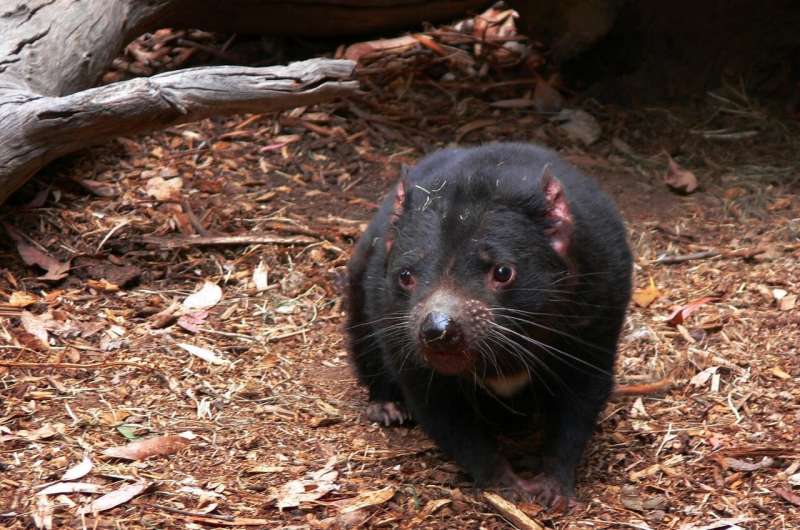December 9, 2020 report
Contagious form of cancer drives Tasmanian devils to become antisocial

Bob Yirka
news contributor

A team of researchers from Australia and the U.S. has found that a form of facial cancer in Tasmanian devils drives them to become antisocial. In their paper published in the journal Proceedings of the Royal Society B, the group describes their study of the creatures in the wild and how they behave when they begin to develop tumors.
Devil facial tumor disease (DFTD) is a contagious form of cancer in Tasmanian devils. The cancer is not virus-related, but instead is spread when cancerous tissue from one animal comes into contact with exposed tissue in another animal—generally as a result of biting. The cancer leads to tumors in the jaw and mouth that reduce the animals' ability to eat. Victims typically die within a year. DFTD has had a big impact on the devils—over the past two decades, it has wiped out nearly 80% of them. In this new effort, the researchers have found that DFTD also has an impact on devil behavior.
To learn more about the impact of DFTD on wild Tasmanian devils, which until recently were found only on the island of Tasmania, the researchers captured 22 of them and attached special collars around their necks. In addition to tracking the animals, the collars also showed the proximity of animals wearing the same type of collar. Before releasing them, the researchers tested them for DFTD, noting the progression of tumors. The researchers also recaptured each of those with collars every month to find out if those uninfected at the start of the trial had been infected and to see how those that had been infected were faring.
The researchers found that as the tumors grew larger, Tasmanian devils reduced socialization. And when the tumors reached a certain size, the devils did not socialize at all. The researchers suggest such behavior has slowed the spread of DFTD, likely preventing Tasmanian devils from going extinct.
Written for you by our author —this article is the result of careful human work. We rely on readers like you to keep independent science journalism alive. If this reporting matters to you, please consider a (especially monthly). You'll get an ad-free account as a thank-you.
More information: David G. Hamilton et al. Infectious disease and sickness behaviour: tumour progression affects interaction patterns and social network structure in wild Tasmanian devils, Proceedings of the Royal Society B: Biological Sciences (2020).
Journal information: Proceedings of the Royal Society B
© 2020 Science X Network



















